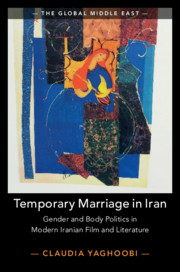Book contents
- Temporary Marriage in Iran
- The Global Middle East
- Temporary Marriage in Iran
- Copyright page
- Dedication
- Contents
- Acknowledgments
- Note on Transliteration, Dates, and Translation
- Prologue
- Part I General Overview
- Part II Representation of Sigheh/Sex Work in the Literature of the Pahlavi Era
- 2 Gendered Violence in Moshfeq-e Kazemi’s Tehran-e Makhuf
- 3 The Volatile Sigheh/Sex Workers’ Bodies in Jamalzadeh’s Ma’sumeh Shirazi
- 4 Colonized Bodies in Al-e Ahmad’s “Jashn-e Farkhondeh”
- 5 The Grotesque Sigheh/Sex Worker’s Body in Golestan’s “Safar-e ‘Esmat”
- 6 Bodily Inscriptions in Chubak’s Sang-e Sabur
- Part III The Islamic Republic and Sigheh in the Film Industry
- Bibliography
- Index
3 - The Volatile Sigheh/Sex Workers’ Bodies in Jamalzadeh’s Ma’sumeh Shirazi
from Part II - Representation of Sigheh/Sex Work in the Literature of the Pahlavi Era
Published online by Cambridge University Press: 13 January 2020
- Temporary Marriage in Iran
- The Global Middle East
- Temporary Marriage in Iran
- Copyright page
- Dedication
- Contents
- Acknowledgments
- Note on Transliteration, Dates, and Translation
- Prologue
- Part I General Overview
- Part II Representation of Sigheh/Sex Work in the Literature of the Pahlavi Era
- 2 Gendered Violence in Moshfeq-e Kazemi’s Tehran-e Makhuf
- 3 The Volatile Sigheh/Sex Workers’ Bodies in Jamalzadeh’s Ma’sumeh Shirazi
- 4 Colonized Bodies in Al-e Ahmad’s “Jashn-e Farkhondeh”
- 5 The Grotesque Sigheh/Sex Worker’s Body in Golestan’s “Safar-e ‘Esmat”
- 6 Bodily Inscriptions in Chubak’s Sang-e Sabur
- Part III The Islamic Republic and Sigheh in the Film Industry
- Bibliography
- Index
Summary
The focus of Chapter 3 is Mohammad Ali Jamalzadeh’s Ma’sumeh Shirazi (Ma’sumeh from Shiraz), in which he pits an ill-reputed sigheh/sex worker against an evil high-ranking cleric, highlighting the relationship between sigheh and the clerics. Ma’sumeh is a victim of the existing sociopolitical system that pushes her to marginalization, abuse, and violence. However, even though Ma’sumeh is stigmatized, she also takes up an important sexual position in the social imaginary of the novel’s world. Here once again, the sociocultural, political, and religious corruption of society is mapped out on the female body; and female sexuality is politicized through the interwoven network between sigheh/sex work and sociocultural and political institutions. These are the various sociopolitical and religious institutions that reduce women to the biological and corporeal, instrumentalizing the female body to political and religious advantage without viewing individual women as autonomous subjects. Nonetheless, by the end of the novel, Jamalzadeh desubjugates Ma’sumeh by giving her a voice to defend her rights and complain about the hypocrisy of the religious cleric to the Divine. Only within the realm of the divine court can she find justice. To have a voice, Ma’sumeh must rewrite the normative sociocultural, religious, and political scripts.
Keywords
- Type
- Chapter
- Information
- Temporary Marriage in IranGender and Body Politics in Modern Iranian Film and Literature, pp. 107 - 133Publisher: Cambridge University PressPrint publication year: 2020

